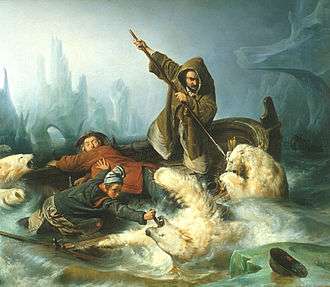François-Auguste Biard


François-Auguste Biard (Lyon, 29 June 1799 – Les Plâtreries, Samois-sur-Seine,[1][2] 20 June 1882) was a French genre painter. He travelled extensively around the world. He was particularly successful in rendering burlesque groups like in Sea Sickness on a British Corvet (Dallas Museum of Art).
In 1858, when his career was in decline, he spent two years in Brazil. In Rio de Janeiro, he enjoyed the protection of the emperor Dom Pedro II. He traveled to the rainforests of Espírito Santo and Amazônia, where he extensively depicted native populations. As Araujo explains, Biard was among the very first European painters to meet and depict these populations. In 1862, after returning in France, Biard published the travelogue Deux Années au Brésil with Hachette.
Biard was known as an abolitionist because of the paintings representing the Atlantic slave trade. Yet, historian Ana Lucia Araujo showed that the painter was never an abolitionist[3] His paintings representing the Atlantic slave trade were rather intended to highlight the history of France.
Biard's painting, Scenes on the Coast of Africa, was the inspiration behind Isaac Julien's short film The Attendant (1993).
References
- ↑ (French) Le cimetière de Samois - Personnes célébres et bienfaiteurs enterrés au cimetière du village
- ↑ (French) Samois en bordure du massif de Fontainebleau. Les hameaux de Samois
- ↑ .Araujo, Ana Lucia. Brazil Through French Eyes: A Nineteenth-Century Artist in the Tropics (Albuquerque: University of New Mexico Press, 2015).
| Wikimedia Commons has media related to François-Auguste Biard. |
![]() This article incorporates text from a publication now in the public domain: Wood, James, ed. (1907). "Biard, Auguste François". The Nuttall Encyclopædia. London and New York: Frederick Warne.
This article incorporates text from a publication now in the public domain: Wood, James, ed. (1907). "Biard, Auguste François". The Nuttall Encyclopædia. London and New York: Frederick Warne.
External links
-
 Cooper, Thompson (1884). "Biard, Auguste François". Men of the Time (eleventh ed.). London: George Routledge & Sons. pp. 117–118.
Cooper, Thompson (1884). "Biard, Auguste François". Men of the Time (eleventh ed.). London: George Routledge & Sons. pp. 117–118. - Biard, Auguste François, 1798-1882. Deux années au Brésil (collab.: Riou, Edouard, 1833-1900) . Paris : Librairie de L. Hachette et Cie, 1862. (Biblioteca Brasiliana Guita e José Mindlin; Universidade de São Paulo).